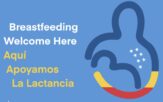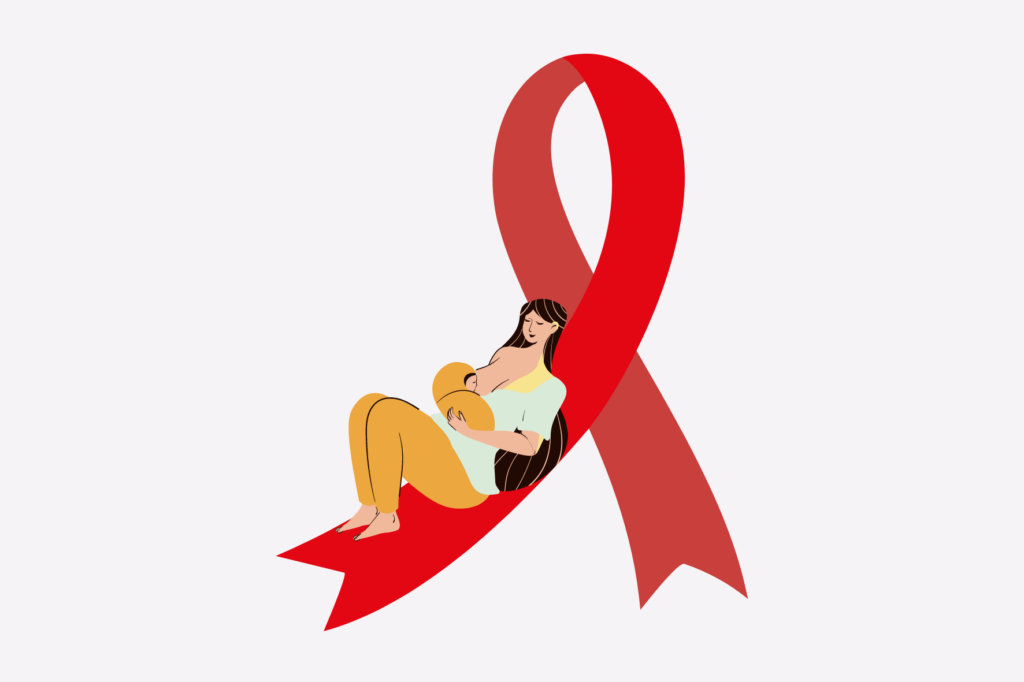A recent major update to the Department of Health and Human Services (DHHS) Perinatal HIV Clinical Guidelines published January 2023 supports parents living with Human Immunodeficiency Virus – also called HIV – (the virus that causes AIDS) to make informed and individualized choices regarding infant feeding. The updated guidelines support a shared decision-making model to provide parents with information and tools to make informed decisions about feeding their baby and acknowledge the health benefits of breastfeeding for both parent and child. This update is significant as it empowers and equips parents to make an individualized feeding choice for their infant and supports health care providers in guiding their patients through these discussions and the decision-making process.
Why is a shared decision-making model important?
Parents living with HIV deserve accurate and relevant data to exercise autonomy as they make informed decisions about their health care, recognizing that each individual and family unit have unique experiences, values, and circumstances that impact their health and health care decisions. Historically, in the US and other higher-resource settings, breastfeeding was not recommended or even prohibited for parents living with HIV due to the risk of HIV transmission to the infant through breastmilk. Formula or donor milk was recommended to eliminate any risk of HIV transmission after delivery. Parents choosing to breastfeed despite this guidance often did so without the support or knowledge of their health care provider, potentially due to concerns regarding involvement of Child Protective Services (CPS). The updated guidelines support parents to have agency in their feeding choices and explicitly state that involvement of CPS or other agencies is inappropriate.
Why is antiretroviral therapy (ART) important?
HIV medication, also called antiretroviral therapy or ART, work in the body to reduce HIV to undetectable levels in the blood. Many ART regimens consist of 1 pill taken once daily with minimal to no side effects. ART is recommended for all people living with HIV, regardless of their disease status or CD4 cell count. Without ART, the risk of HIV transmission to a baby during pregnancy is around 25% (1 in 4 babies). Effective ART with viral suppression during pregnancy and delivery significantly reduces the risk of HIV transmission to the infant, resulting in less than 1 transmission per 100 babies (less than 1%). After delivery, babies born to parents living with HIV take ART medication for 2-6 weeks to provide prophylaxis against HIV transmission and are tested for HIV until 4-6 months of age.
Parents living with HIV taking HIV medication with viral suppression have a very low risk (less than 1%) of passing HIV to their baby through breastfeeding. Adherence to ART during pregnancy and breastfeeding is crucial to keep this risk as low as possible. Additionally, babies who are breastfed will often take HIV medication while they are receiving breastmilk to provide further protection from HIV. These babies are tested for HIV until 6 months after they stopped receiving breastmilk. Parents who are breastfeeding will also have their HIV levels monitored closely, every 1-2 months, while they are breastfeeding.
What challenges do parents face while breastfeeding with HIV?
Parents living with HIV often face challenges during pregnancy and breastfeeding. Partners may differ in their feeding preferences for their child which can complicate the decision-making process and lead to less support for the breastfeeding parent. Parents may feel cultural or societal pressure to breastfeed or not to breastfeed, depending on their background and community. In some communities, not breastfeeding is equivalent to disclosing your HIV status so privacy can be jeopardized. In other settings, parents may be strongly discouraged from breastfeeding by those aware of their HIV status. Parents may face stigma from the medical community for making any choice that could increase the risk of HIV transmission to their baby. Parents may struggle with HIV medication adherence during the post-partum period as they navigate recovery from pregnancy and delivery while caring for a newborn.
Challenges may arise during breastfeeding that increase the risk of HIV transmission. Breastfeeding problems such as cracked or bleeding nipples, maternal breast skin infection, infant thrush, or mastitis can all increase the risk of HIV transmission. Gastrointestinal illness in either parent or child can increase the risk of transmission, either due to inability to take medications or increased susceptability to infection due gut irritation. Early introduction of solids or mixed feeding with both breast milk and formula prior to 6 months of age can also increase the risk of transmission. Strategies to reduce these risks as much as possible include lactation support to enhance breastfeeding technique, exclusive breastfeeding through 6 months of age (although short periods of formula supplementation for poor weight gain or low supply are okay), avoiding breastfeeding during illness, HIV medication adherence for both parent and child, and frequent HIV testing. Rapid weaning over a period of days can increase the amount of HIV present in breastmilk, so weaning over a longer period (several weeks) is encouraged in most situations.
Community organizations and peer support can be instrumental in supporting parents through their pregnancy and breastfeeding journey and providing real-time advice and encouragement during challenging periods. Parents living with HIV often choose to engage in breastfeeding support communities specific to HIV as they may be more comfortable in those settings given their unique situation.
How is the role of healthcare providers?
Healthcare providers can be instrumental in supporting their patients through this process by encouraging open and honest discussion. Patient-centered counseling about infant feeding should begin as early as possible, either before conception or early in pregnancy. This allows for sharing of information and discussion on multiple occasions. Providers need to be educated about the most current guidelines and data so their patients have access to this information. Anticipatory guidance is critical to ensure families are prepared for both delivery and the post-natal period in terms of medications needed and the schedule of medical visits and HIV testing for both parent and child. Patients need to have accurate contact information for their provider to promote communication and enable prompt resolution to problems that may arise. Open communication between different team members, such as OB, pediatrics, infectious diseases, social work, and lactation is needed to communicate the feeding plans and strategies to deal with any issues that may arise. Providers need to communicate their support for the autonomy of their patients and minimize stigma and barriers to seeking care. By working together, providers and parents can promote the child’s health and ensure a successful feeding experience. At Duke, we have ongoing multi-disciplinary collaboration between Pediatric and Adult Infectious Diseases, Perinatal, and Breastfeeding Medicine providers, as well as social workers and outreach support services to ensure positive outcomes for families.
Please feel free to contact us for more information:
Jennie Dougherty, NP
Pediatric Nurse Practitioner
Duke Pediatric Infectious Diseases
Jp121@duke.edu
919-684-6335
Annie Dotson, MD, IBCLC, MSPH
Family Medicine/Primary Care Physician
andrea.dotson@duke.edu
Learn more:
- The Well Project is a community organization based in Philadelphia that provides education, advocacy and support to women living with HIV https://www.thewellproject.org/hiv-information/overview-infant-feeding-options-parents-living-hiv and maintains a list of OB GYN, Infectious Disease, and Pediatric providers with knowledge and experience to support breastfeeding parents living with HIV https://www.thewellproject.org/hiv-information/list-us-based-providers-who-support-informed-infant-feeding-choices-parents-hiv
- Read the updated DHHS guidelines for yourself at https://clinicalinfo.hiv.gov/en/guidelines/perinatal/infant-feeding-individuals-hiv-united-states?view=full or a short summary from the CDC https://www.cdc.gov/breastfeeding/breastfeeding-special-circumstances/maternal-or-infant-illnesses/hiv.html

